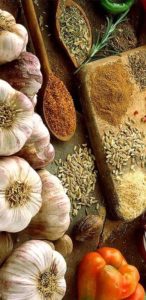From our list of herbs and spices, the following are recommended for Irritable Bowel Syndrome:
Scroll down for links.
- Althea Root
- Apple Pectin
- Asparagus Root
- Banana
- Barberry Root
- Barley Grass
- Black Walnut Hull
- Blessed Thistle
- Chamomile
- Fenugreek
- Flaxseed
- Ginger Root
- Goldenseal Root
- Grapefruit Seed
- Hops
- Kola Nut
- Lemon Balm
- Malva Leaf
- Marshmallow Root
- Milk Thistle
- Oat Straw
- Passion Flower
- Peppermint
- Peppermint Leaf
- Psyllium
- Rosemary
- Slippery Elm Bark
- Valerian Root
Natural Cures and Remedies for Irritable Bowel Syndrome
Irritable bowel syndrome: herbalists recognise many variants of IBS and the treatment will vary accordingly; this individualised approach leads to a very high rate of permanent relief from the symptoms.

Because of the anthraquinones, nonstandardized preparations should be avoided during pregnancy and lactation (CAN). “Anthraquinones may be secreted into breast milk.” Also contraindicated in arthrosis, hemorrhoids, and nephropathy (CAN), intestinal obstruction, abdominal pain of unknown causes, any enterosis (appendicitis, colitis, Crohns disease, and irritable bowel syndrome), hemorrhoids, nephropathy, menstruation (AHP), and urethrosis (CAN). Not for use in cases of diarrhea or abdominal pain. Discontinue use if diarrhea or watery stools occur. Consult a health care provider in cases of pregnancy or lactation. Not for long-term use, use more than 8-10 days, or overdosage (AHP, CAN). Rhubarb leaves, high in oxalic acid, should not be eaten (CAN). One case of anaphylaxis following ingestion reported (CAN). Contains 4-11% stilbene derivatives, which pose such risks that the herb “can no longer be recommended” (SHT). While widely used, anthranoid-containing laxatives can be habit-forming; some contain compounds suspected of being cytotoxic, genotoxic, mutagenic, and even tumorigenic. Epidemiological studies in Germany reveal that abusers of anthranoid laxatives have a three times higher rate of colon carcinoma (AEH).
Althea Root, Apple Pectin, Asparagus Root, Banana, Barberry Root, Barley Grass, Black Walnut Hull, Blessed Thistle, Chamomile, Fenugreek, Flaxseed, Ginger Root, Goldenseal Root, Grapefruit Seed, Hops, Kola Nut, Lemon Balm, Malva Leaf, Marshmallow Root, Milk Thistle, Oat Straw, Passion Flower, Peppermint, Peppermint Leaf, Psyllium, Rosemary, Slippery Elm Bark, Valerian Root
Also contraindicated in endometriosis, hemorrhoids, and nephropathy (CAN; JAD), intestinal obstruction, abdominal pain of unknown causes, any enteritis (appendicitis, colitis, Crohns disease, irritable bowel syndrome), menstruation (AHP). Do not use more than 8-10 days (AHP). Do not use this product if you have abdominal pain or diarrhea. Consult a health care provider prior to use if pregnant or nursing. Discontinue use in the event of diarrhea or watery stools. Do not exceed recommended dose. Not for long-term use. These are the recommendations normally given for anthraquinone-containing plants, but not given for this anthraquinone-containing plant (AHP).
Ulcerative colitis and Crohns disease are the two types of irritable bowel syndrome (IBS). Both ulcerative colitis and Crohns disease have similarities, and often it is difficult to distinguish between the two. As a general rule, ulcerative colitis is an inflammation limited to the wall of the colon (bowel). Its symptoms include abdominal cramps, fever, and bloody diarrhea. Similar symptoms, generally affecting the ileum (a portion of the small intestine) and without blood in the stools, are generally suggestive of Crohns disease.
Also contraindicated in hemorrhoids and nephropathy (CAN), intestinal obstruction, abdominal pain of unknown causes, any enterosis (appendicitis, colitis, Crohns disease, irritable bowel syndrome) hemorrhoids, nephropathy, menstruation (AHP). Do not use more than 8-10 days (AHP). Do not use this in case of abdominal pain or diarrhea. Consult a health care provider prior to use in pregnancy or nursing. Discontinue use if diarrhea or watery stools occur. Not for long term use (AHP). “Some herbal laxative preparations, such as cascara and senna for example, can cause an increase in the potency of digoxin” (D’epiro, 1997). Pedersen (1998) cautions against taking the fresh leaf (we have done that in Peru with modest laxative results).
Althea Root
Apple Pectin
Asparagus Root
Banana
Barberry Root
Barley Grass
Black Walnut Hull
Blessed Thistle
Chamomile
Fenugreek
Flaxseed
Ginger Root
Goldenseal Root
Grapefruit Seed
Hops
Kola Nut
Lemon Balm
Malva Leaf
Marshmallow Root
Milk Thistle
Oat Straw
Passion Flower
Peppermint
Peppermint Leaf
Psyllium
Rosemary
Slippery Elm Bark
Valerian Root
German chamomile is normally sold under the name of chamomile’ or camomile’ in shops and supermarkets, usually as tea bags. Chamomile is an excellent herb to soothe painful conditions of the digestive tract, to reduce bloating and relax tension in the bowel. It is most useful for conditions associated with anxiety and stress – so-called nervous indigestion’. Hence it is often helpful for sufferers of irritable bowel syndrome (IBS). Chamomile is great for children’s tummy aches and for morning sickness in pregnant women.
